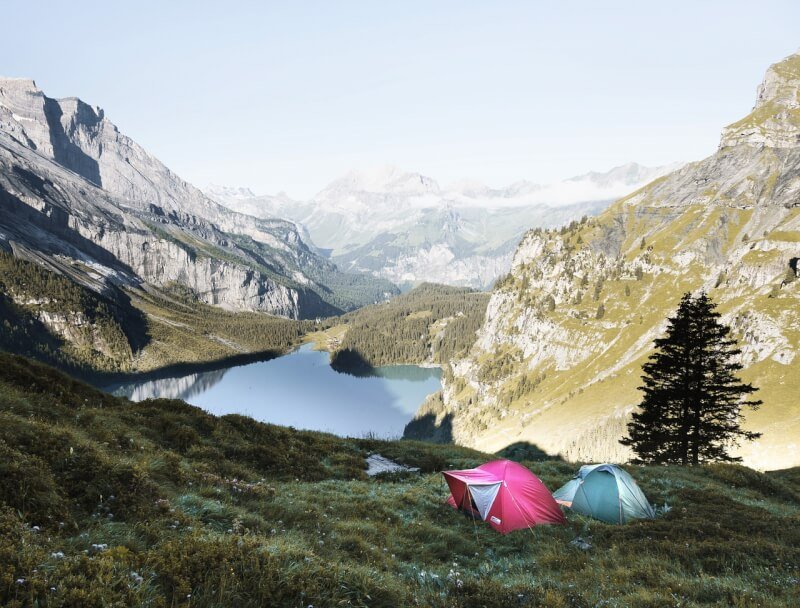Imagine yourself nestled in a cozy tent, surrounded by the enchanting sights and sounds of nature. As the crackling campfire warms your soul, you can’t help but feel a sense of awe and wonder at the beauty that surrounds you. This article delves into the captivating world of camping, recounting thrilling adventure stories that teach valuable lessons learned from Mother Nature herself. From unexpected encounters with wildlife to surviving unforeseen challenges, these camping tales will inspire and educate, reminding us of the profound wisdom nature has to offer. So grab your camping gear and prepare to embark on an unforgettable journey through the great outdoors.
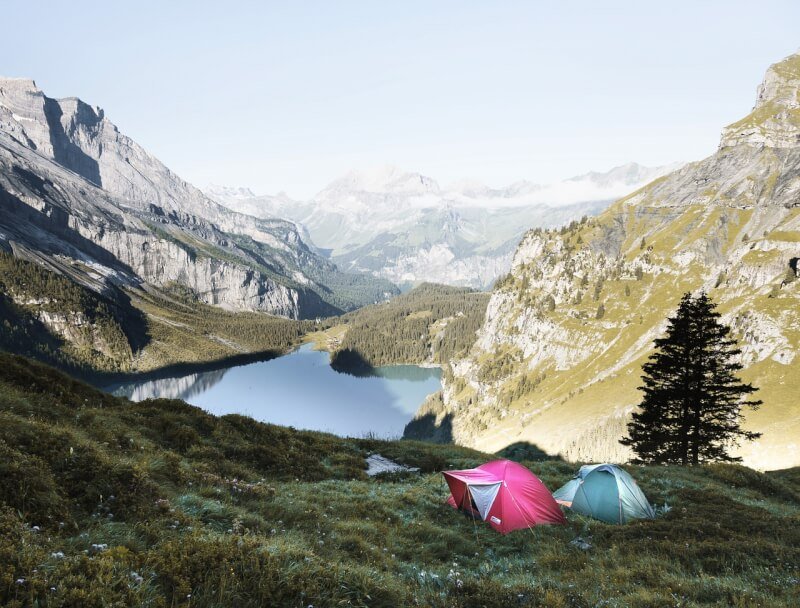
Preparing for a Camping Adventure
When it comes to planning a camping adventure, there are a few key things to consider. One of the first steps is choosing the right camping gear. This includes essentials like a tent, sleeping bag, camping stove, and cooking utensils. Depending on the type of camping you’ll be doing, you may also want to invest in camping chairs, hammocks, or even portable grills. It’s important to choose gear that is durable, lightweight, and suited to your specific needs.
Once you have your gear sorted, it’s time to pack the essential supplies. This includes items like food, water, and clothing. When it comes to food, consider meal planning and bringing non-perishable snacks. Don’t forget to pack plenty of water or a water filtration system if you’ll be camping in an area without easy access to clean water sources. As for clothing, it’s important to bring layers that will keep you warm at night and protect you from the elements during the day.
Before setting off on your camping adventure, it’s crucial to understand the campground rules. Each campground may have its own set of rules and regulations that must be followed for the safety and enjoyment of all campers. This may include guidelines regarding noise levels, fires, and the use of common areas. Take the time to familiarize yourself with these rules to ensure a smooth and respectful camping experience for everyone involved.
Navigating the Wilderness
Once you’re out in the wilderness, navigating your way around becomes essential. Get familiar with maps and compasses before your trip to ensure you can find your way. Maps provide a visual representation of the area you’ll be exploring, while compasses can help you determine your direction. Take the time to study the maps and practice using a compass before you head out.
Another useful tool for navigation is following trail markings. These markings, such as blazes on trees or signs along the trail, can guide you along your route and prevent you from getting lost. Pay attention to these markings and make sure to stay on the designated trail to avoid getting disoriented or entering protected areas.
In this age of technology, GPS devices have become a popular navigation tool for campers. These devices use satellite technology to pinpoint your location and provide real-time information about your surroundings. While they can be incredibly helpful, it’s important to have a backup plan in case the device malfunctions or the battery dies. Always bring a map and compass as a fail-safe option.
Staying Safe in the Great Outdoors
When camping, safety should always be a top priority. One of the first steps in ensuring a safe camping experience is setting up a safe campsite. Choose a level and stable area for pitching your tent, away from hazards like dead trees, cliffs, or potential flooding areas. Clear the ground of any sharp objects or debris that could be a tripping hazard.
Identifying potential hazards within the campground is also crucial. This includes recognizing poisonous plants, such as poison ivy or poison oak, and staying away from them. Be aware of any nearby bodies of water and take precautions to prevent accidents, especially if you’ll be camping with children. Familiarize yourself with any potential wildlife in the area and take necessary precautions to avoid encounters.
Knowing basic first aid is an essential skill for any camper. Accidents can happen, and being prepared to handle common injuries like cuts, burns, or sprains can make all the difference in a remote camping location. Bring a fully stocked first aid kit and take the time to educate yourself on how to use the supplies within. Consider taking a first aid course before your camping adventure to further enhance your skills.
Dealing with Wildlife
Encountering wildlife can be a thrilling experience, but it’s important to approach it with caution. One way to be more aware of their presence is by recognizing animal tracks. Animal tracks can provide clues about the types of animals in the area and whether they are common or rare. By being able to identify these tracks, you can have a better understanding of the wildlife you may encounter.
Avoiding wildlife encounters is vital for both your safety and the animals’ well-being. Keep a safe distance from all wildlife and never attempt to feed or approach them. Keep all food and scented items securely stored to prevent attracting animals to your campsite. Remember, wildlife should be observed from a distance and not disturbed or threatened.
Proper food storage is crucial to prevent animal intrusion at your campsite. Use bear-resistant containers or hang food from a tree branch at least 10 feet off the ground and 5 feet away from the trunk. This will help deter animals from getting to your food and reduce the risk of them becoming habituated to human food, which can be dangerous for both humans and wildlife.
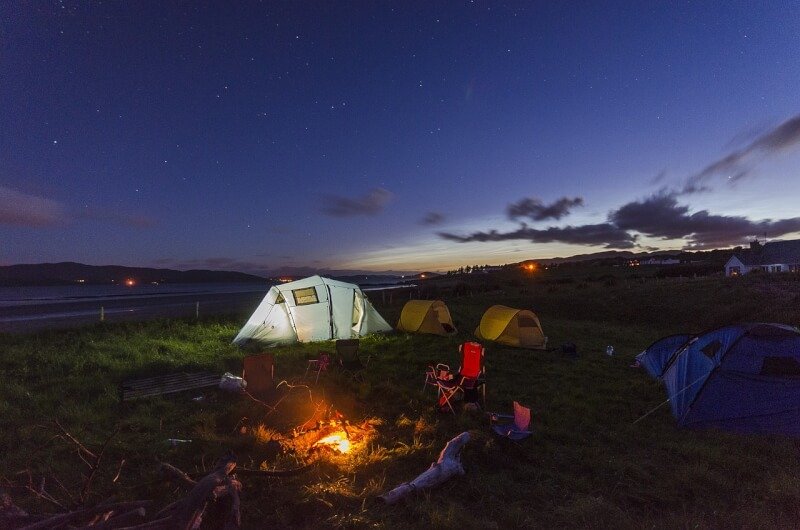
Weathering the Elements
Mother Nature can be unpredictable, so it’s important to be prepared for different weather conditions. This starts with checking the weather forecast before you head out on your camping adventure. Pack suitable clothing and gear for the expected weather, but also be prepared for unexpected changes in temperature or precipitation.
Setting up a weatherproof shelter is essential for staying dry and protected from the elements. Choose a tent that is designed for the climate you’ll be camping in and ensure it is properly waterproofed. Additionally, consider investing in a quality tarp to provide extra protection from rain or harsh winds. Be mindful of where you pitch your tent and avoid areas prone to flooding or strong winds.
Staying dry and warm is crucial for your comfort and well-being while camping. Pack moisture-wicking clothing that will keep you dry and warm even if you sweat or encounter rain. Layer your clothing to trap heat and insulate your body. Don’t forget essential items like a waterproof jacket, a warm hat, and thick socks to help regulate your body temperature.
Finding Food and Water Sources
When camping, finding food and clean water sources is a necessity. It’s important to identify safe water sources for drinking and cooking. Look for flowing water, such as streams or rivers, as these are less likely to contain harmful bacteria or parasites. If in doubt, use a water filtration system or bring water purification tablets to ensure your water is safe to consume.
Basic wilderness cooking techniques can turn a simple camping trip into a culinary adventure. Learn how to use a camping stove or build a campfire for cooking. Bring lightweight cookware and utensils that are suitable for outdoor cooking. Consider meal planning and prepping ingredients beforehand to ensure you have a variety of delicious and nutritious meals to enjoy while camping.
Foraging for edible plants is a fun and educational way to supplement your camping meals. However, it’s crucial to have a comprehensive knowledge of edible plants in the area and be able to accurately identify them. Consult a field guide or consider taking a foraging course to learn more about local edible plants and how to safely harvest and prepare them.
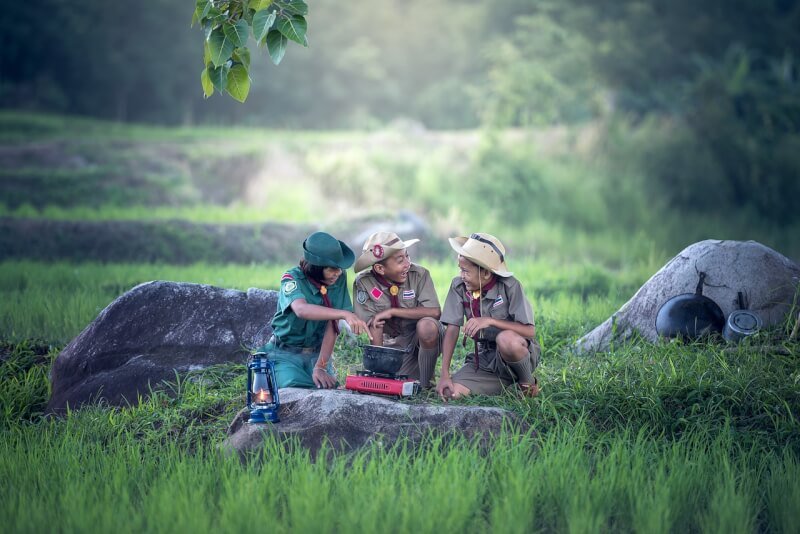
Survival Skills in Emergency Situations
While nobody wants to experience an emergency situation while camping, it’s important to be prepared. Building emergency shelters can provide temporary protection in case you become lost or need to take shelter from extreme weather conditions. Learn how to construct simple shelters using natural materials like branches, leaves, or even snow.
Knowing how to start a fire without matches can be a life-saving skill in certain situations. Practice using alternative fire-starting methods such as a fire starter, flint and steel, or friction-based methods like the bow drill or hand drill. Familiarize yourself with local regulations regarding campfires to ensure you follow proper safety guidelines.
In case of an emergency, signaling for help is crucial. Learn different signaling techniques, such as using a whistle, mirror, or brightly colored cloth to attract attention. Create a distress signal that can be easily recognized and understood by others who may be passing by. Additionally, carrying a personal locator beacon or satellite messenger can greatly increase your chances of being rescued in remote areas.
Respecting and Preserving Nature
As outdoor enthusiasts, it’s our responsibility to respect and preserve the natural places we visit. Following Leave No Trace principles ensures that future generations can also enjoy the beauty of the outdoors. This includes packing out all trash, disposing of waste properly, and minimizing our impact on the environment.
Proper waste disposal is essential for keeping the campground and surrounding areas clean and free from contamination. Pack garbage bags and dispose of all waste, including food scraps, in designated trash receptacles. If camping in a remote area without these facilities, pack out all trash and dispose of it properly when you have access to proper waste management facilities.
Protecting plants and wildlife is crucial for maintaining a healthy ecosystem. Avoid trampling or picking vegetation and refrain from disturbing wildlife or their habitats. Observe animals from a distance and resist the urge to feed or approach them. By practicing responsible camping, we can contribute to the conservation of our natural environment.
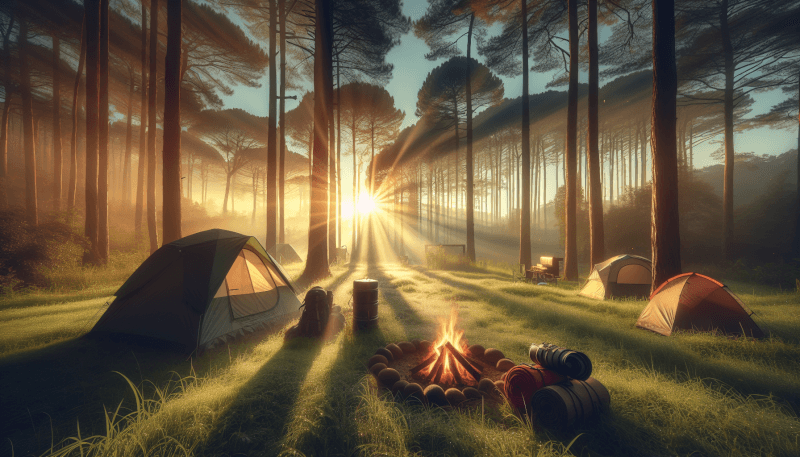
Camping Activities and Outdoor Games
Camping isn’t just about survival skills; it’s also an opportunity for fun and relaxation. Plan activities that will keep you and your fellow campers entertained. Fun and educational scavenger hunts can be tailored to the natural surroundings, encouraging participants to explore and learn about the environment around them.
Nature photography is another enjoyable activity that allows you to capture the beauty of the outdoors. Bring a camera or smartphone with a good quality camera and capture stunning landscapes, wildlife, or even macro shots of plants and insects. Get creative and experiment with different angles and lighting to truly capture the essence of your camping adventure.
Birdwatching and wildlife observation are popular outdoor activities that can be enjoyed while camping. Research the local bird species and wildlife that can be found in the area and bring a pair of binoculars for better visibility. Take your time to observe the animals in their natural habitats and learn about their behaviors and adaptations.
Memorable Camping Stories
Camping adventures often come with memorable stories that are worth sharing. Unexpected wildlife encounters can be thrilling and provide unforgettable moments. Whether it’s spotting a deer from your campsite or coming across a bear while on a hike, these encounters add excitement and a sense of wonder to your camping experience.
Surviving extreme weather conditions can also make for a memorable camping story. From being caught in a sudden thunderstorm to enduring freezing temperatures during an unexpected cold front, these challenging moments can test our resilience and remind us of the power of nature.
Getting lost in the wilderness and finding your way back can be a daunting experience. Whether it’s losing the trail or wandering off on a solo adventure, finding your way back to safety can be a mix of fear, determination, and relief. These stories of being lost and found serve as a reminder of the importance of navigation skills and preparedness in the great outdoors.
In conclusion, preparing for a camping adventure involves careful consideration of gear, essential supplies, and understanding campground rules. Navigating the wilderness requires familiarity with maps, compasses, and trail markings, as well as the use of GPS devices as a backup. Staying safe in the great outdoors involves setting up a safe campsite, identifying potential hazards, and knowing basic first aid. Dealing with wildlife requires recognizing animal tracks, avoiding encounters, and proper food storage. Weathering the elements involves preparing for different weather conditions, setting up a weatherproof shelter, and staying dry and warm. Finding food and water sources involves identifying safe water sources, learning basic wilderness cooking techniques, and foraging for edible plants. Survival skills in emergency situations involve building emergency shelters, starting a fire without matches, and signaling for help. Respecting and preserving nature involves following Leave No Trace principles, proper waste disposal, and protecting plants and wildlife. Camping activities and outdoor games provide opportunities for fun and relaxation. Finally, memorable camping stories are created through unexpected wildlife encounters, surviving extreme weather, and getting lost and found in the wilderness. So go out, enjoy the great outdoors, and make memories that will last a lifetime.


